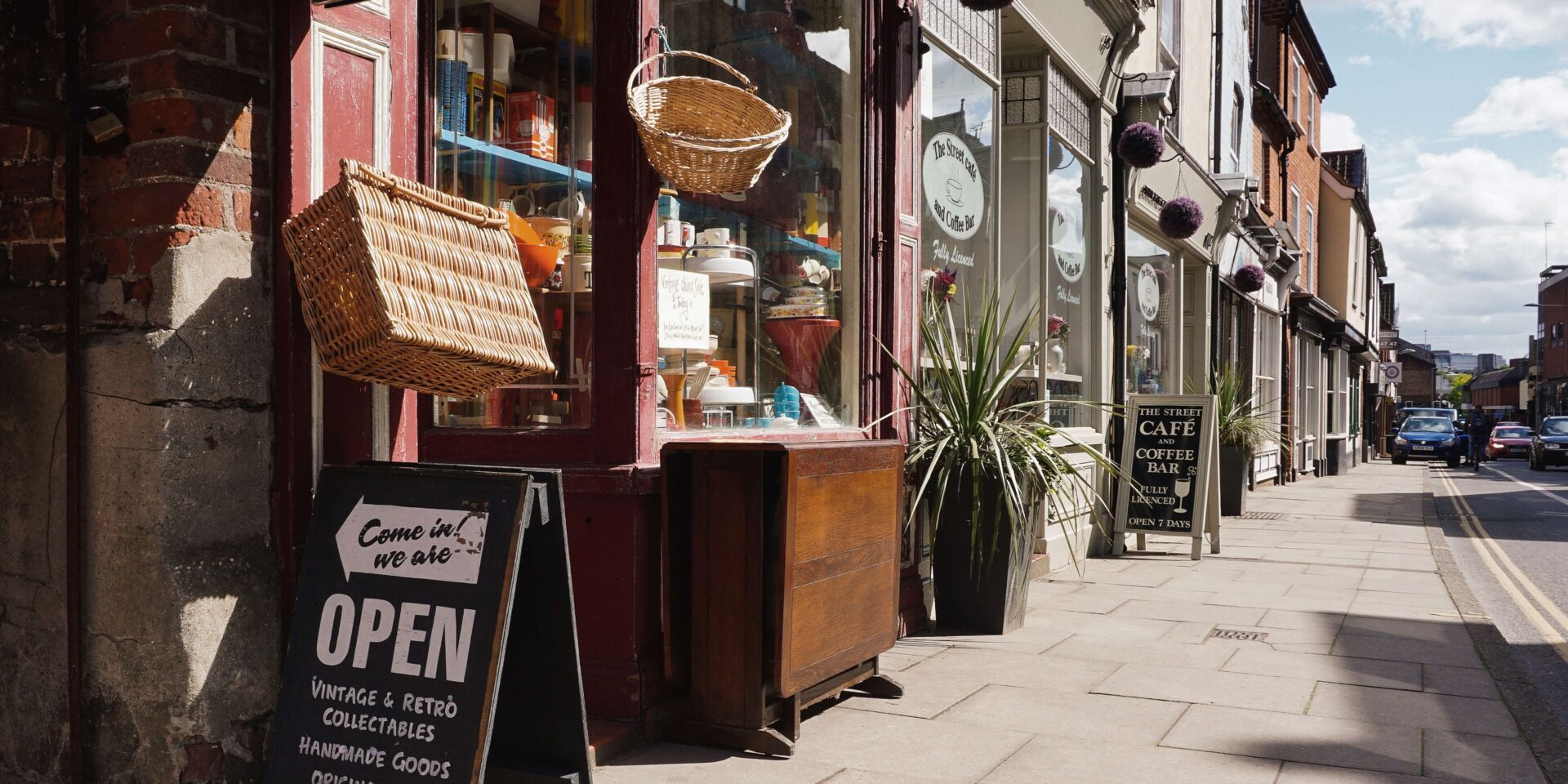
With the advent of online shopping, brick-and-mortar stores have fallen a bit out of favor. For many consumers, being able to shop from the comfort of their own homes is a real draw that regular stores just can’t compete with. After all, why should you put on pants and shoes when you can stay in your pajamas all day?
Yet brick-and-mortar stores offer valuable services and functions that online shopping can’t always compete with, including the human element that makes shopping a social activity. But what is a brick-and-mortar store, and is it worth investing in one for your business?
Understanding Brick-and-Mortar Stores
The term “brick-and-mortar store” refers to a traditional business that has a physical location. This type of business provides goods and services to its customers face-to-face, which is something that many people still prefer over online shopping.
In this type of store, customers get to browse, speak with sales representatives for any kind of assistance that they need, and test or try on products. Customers have an experience while shopping in these stores. Doing so also gives them instant gratification by enabling them to walk out with what they’ve purchased.
Although online shopping did deal a blow to brick-and-mortar stores, the latter found ways of rallying by adapting. Brick-and-mortar stores now have an online presence and offer hybrid shopping experiences that focus on customer convenience.
Types of Brick-and-Mortar Stores
You may have a set idea of what a brick-and-mortar store looks like, but not all of them are the same. Learn more about the various types of physical stores that fit under this term.
Department Stores
Department stores are retail establishments that sell a large variety of products. They’re organized into many departments, each one focused on a different category. Think of a store that sells toiletries, furniture, clothing, and electronics. All of those are different departments under the same roof.
Department stores are convenient for buyers. They offer centralized purchasing, which means customers purchase all the goods they want in one location — usually at the front of the store.
Grocery Stores
Grocery stores are food service retail entities that offer a range of food products, which can be packaged or fresh. At a grocery store, customers get to see, smell, and feel the products they’re considering purchasing. They also have the chance to ask questions from employees and immediately take home what they’ve purchased.
Convenience Stores
Convenience stores are a type of brick-and-mortar business that offers a wide array of goods and services to consumers at a convenient location. Most people know these as the corner stores where they can purchase everything from toilet paper to frozen meat. These stores tend to be small and are often part of a gas station.
Specialty Stores
These brick-and-mortar stores offer specific services to customers. They include bookstores, pet stores, and hardware stores. Specialty stores carry a large selection of what they offer. Just think of a hardware store and all the brands and types of items they have for sale.
Brick-and-Mortar vs. e-Commerce
If brick-and-mortar stores are physical locations where customers can shop, what is e-commerce? E-commerce refers to the sale of goods and services online. Some companies choose to sell exclusively online, while others provide both online and in-person shopping experiences.
E-commerce is an option that many start-ups choose if they don’t have the funds to invest in a brick-and-mortar store. Some may later transition to a physical location or may remain solely an online retailer. Both types of store options have their benefits and downsides.
Advantages of Brick-and-Mortar Stores
Brick-and-mortar stores offer several benefits both to customers and the business owner.
Reach Customers Who Don’t Shop Online
Not everyone shops online, and some don’t shop online for certain items. Lots of customers, for example, are unsure about buying clothes through the internet because they worry about fit and quality. Businesses that solely sell their products online will never reach this customer base.
Certain demographics are also less tech-savvy and may not rely on the internet very much. Others may not have a clear idea of what they’re looking for and don’t want to spend hours surfing the web when they could just go to a department store. This is something that can happen during the holidays when looking for gifts.
Better Customer Experiences
For many customers, shopping is a social experience. It involves planning an outing with others or engaging with sales representatives to get recommendations and help. Online shopping doesn’t offer this, making the shopping experience an isolating one.
Brick-and-mortar stores also allow customers to see and try products. For items like clothing, many consider this to be a vital service. If they’re not sure of a size, there’s someone they can turn to for help.
Instant Gratification
Some customers don’t want to wait the time it takes for the items they’ve ordered to be shipped to their homes. That’s when they turn to brick-and-mortar stores. As soon as they purchase the product, they have access to it.
Disadvantages of Brick-and-Mortar Stores
Brick-and-mortar stores have their downsides as well. You want to keep them in mind when deciding whether this is the choice for your business.
Higher Operating Costs
When you have a brick-and-mortar store, you have to pay rent or purchase a location. This is one of the biggest issues that people face with physical stores. Paying rent or buying a property makes a significant dent in your profits.
You also need employees. You may need them online, too, but a brick-and-mortar store requires salespeople, cashiers, and at least one maintenance person to keep the store looking its best. None of those salaries are necessary when you run an online business.
Space Limitations
When you have a brick-and-mortar store, the amount of space you have will dictate what you can sell. For companies that sell larger items or that have a wide selection of stock, this factor could keep them from offering as much as they could.
How to Open a Brick-and-Mortar Store?
The first step should be to select the kind of goods and services you want to offer. Once you have a clear idea of what you want to sell, put together a business plan. This needs to include information on your supply chain, the prices you’ll charge, the overhead costs, and many other details that are crucial for you and any future investors.
Next, choose a name you love and start getting all your legal ducks in a row. You need to choose a business structure, which can be complex. Do you want a limited liability company, a C-corp, or a sole proprietorship? Consider the pros and cons of each option. For the majority of people, an LLC or corporation is the right choice.
As part of your legal paperwork, you’ll need several types of business licenses. This can vary depending on your location and the type of goods and services you plan to sell.
You then have to think about your funding. For some people, taking on a small business loan provides the necessary money to find a location and get started. Others rely on crowdfunding, investors, or other options.
Choose your location. When making this choice, don’t focus only on your budget but also on who your target demographic is. You want your location to be convenient for those who will rely on your goods and services most.
The next step is to determine your staffing needs. Unless you have significant funding, you want to start with one or two people and build from there.
Stock up so that your potential customers can get what they want the minute they step through your newly opened doors. You should also put together a marketing plan to spread the word.
Getting Started Correctly
Opening a brick-and-mortar business is often a rewarding experience, but it can come with many complications and potential pitfalls. Getting help can make the complex process run more smoothly.
At doola, we help you set up your LLC or corporation correctly and quickly so that you can focus on making those first sales. Get going today by reaching out to the team at doola.
FAQs
How can brick-and-mortar stores attract customers?
Brick-and-mortar stores can attract customers by offering in-person deals like a gift-with-purchase. Focus on marketing that brings the location into focus, or have a one-time event to encourage people to visit.
What is the significance of location for brick-and-mortar stores?
The location will impact whether the demographic you’re targeting will visit the store. If you provide jewelry for teenage girls, for example, your store has a better chance of succeeding if the location is close to where teen girls spend time. If your demographic doesn’t know you’re there, your business can’t survive.
How can brick-and-mortar stores compete with online retailers?
It’s all about providing an experience at a brick-and-mortar store. Offer customers the personalized shopping experience they can’t get online.
How can brick-and-mortar stores use technology to their advantage?
By offering many types of payment options, in-store pickup for online purchases, as well as e-vites for those who sign up, you can help your business grow. You can also offer inventory apps that can make the shopping experience easier.
How can brick-and-mortar stores adapt to changing consumer behavior?
One important way is to focus on sustainability. You would also want to employ technology to provide the personalized experience customers expect. Offer augmented reality, for example, for product visualizations or smart mirrors for virtual try-ons.




